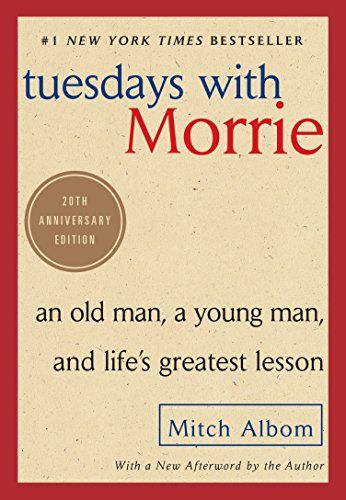
I occasionally wonder about the experience of slipping into life’s End Zone. How will I respond when I get “the call?” In Tuesdays with Morrie, journalist and best selling author Mitch Albom provides a riveting account of watching his former, highly respected professor Morrie Schwartz deal with his own impending demise. “Each Tuesday I flew 700 miles to sit beside this dying man. It felt like a rinse of human kindness,” he says. “I liked myself better when I sat beside Morrie.”
Mitch picks up the story 16 years after taking several courses from Morrie at Brandeis University in Massachusetts. When he graduated he promised to stay in contact with Morrie, but ambition and lucrative opportunities intervened. While flipping through the channels one day, he was surprised to come across Morrie being interviewed by famed American television broadcaster Ted Koppel. The much loved professor had been diagnosed with ALS (Lou Gehrig’s Disease), and was confined to a wheelchair.
Mitch called Morrie’s home and visited him the next Tuesday. The former professor’s mind was still keen to learn and teach. His body though, had endured numerous indignities. He required frequent adjustments of his weak legs and arms. Even his head needed shifting to keep him comfortable. He could no longer dress himself. “In ALS patients,” Mitch observes, “the soul, perfectly awake, is imprisoned in a limp husk.”
The two men quickly resume their former relationship of professor and student. “We’ll write our last thesis,” Morrie says. “The subject will be the meaning of life.” They agree to meet each Tuesday.
When he was diagnosed, Morrie had asked himself if he intended to withdraw from the world, or was he going to live. He decided he was going to live, with dignity, humour, courage and composure. As Morrie discourses, Mitch begins to understand the dying professor is looking at life from a very different place, a healthier place.
Morrie had always gestured with his hands when he talked. Now he can’t lift them higher than his chest. “In the morning I mourn what I’ve lost,” he says. “A little cry, then I focus on the good things, especially the people in my life. It’s wonderful to have so much time to say goodbye to my friends.”
Morrie returns repeatedly to the matter of living a life that has significance. “Most of us walk around like we’re sleep walking,” he says. “We really don’t experience the world fully because we’re doing things we think we have to do. When we’re facing death, we strip away all that stuff and focus on the essentials.”
After several Tuesday visits, Mitch begins to think of Morrie as a man standing on the tracks, listening to death’s locomotive whistle. He knows he will die soon, and is very clear about the important things in life.
Listening to Morrie, Mitch recognizes his own priorities and decisions are making him feel unsettled. He becomes increasingly perplexed by the course his life has taken. Having traded in lots of dreams for a bigger home, more money and a nicer car, his days are full but he is unsatisfied. He yearns for the clarity he sees in Morrie.
Mitch realizes that his professor, now in the last weeks of his life, has attained an understanding of what has true value. Morrie talks about relationships, about loving people, listening carefully to their words, being devoted to community, and especially to creating memories. “All the love we have created,” he says, “and all the memories will still be there after we’re gone. We will still live on in the hearts of those whose lives we have touched and nurtured.”
Tuesdays with Morrie has prompted me to think about my Dad. He had been a skilled heavy equipment operator and an active member of his community. At age 89 his hip broke and he never walked again. During his six years in a long-term care facility, he couldn’t dress himself, turn over in bed, bathe himself and much more. I visited him almost daily and observed how considerate he was toward nurses and care aides. He asked about their family and their interests away from work. He expressed appreciation for their helpfulness to him, and he didn’t complain. Like Morrie, Dad was quick to forgive and refused to dwell on slights.
Tuesdays with Morrie, a great template for life this side of the End Zone.
